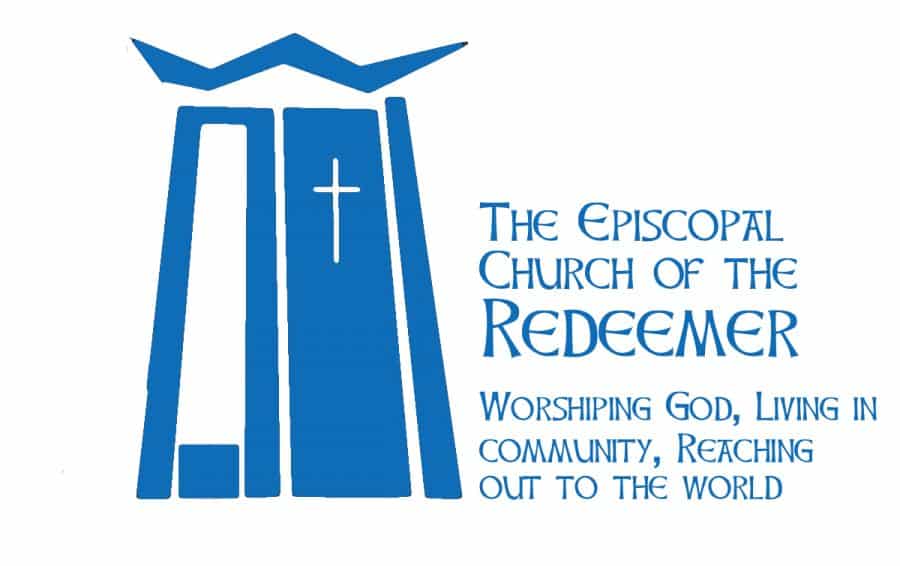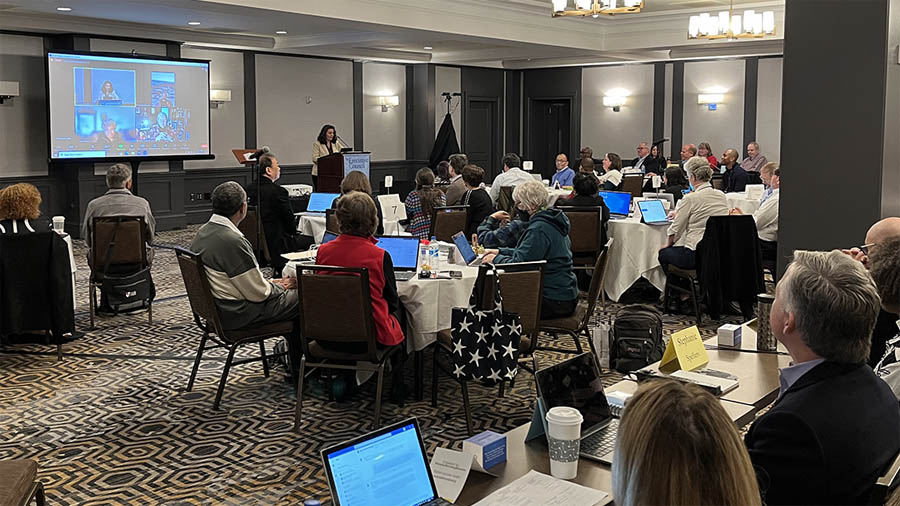[Episcopal News Service – San Francisco, California] The Episcopal Church’s presiding officers opened the February 9-12, 2023, meeting of Executive Council here with welcoming remarks underscoring Episcopal leaders’ increasing emphasis on dismantling the church’s entanglement with unjust systems and institutions, which they said conflict with Christian ideals of love, humility and welcome.
Watch Executive Council’s plenary sessions livestreamed on YouTube.
Most Reverend Michael Curry addresses the Executive Council
Presiding Bishop Michael Curry invoked the Gospel story of Jesus entering Jerusalem on the back of a donkey, noting that Pontius Pilate was entering Jerusalem from the other side on a war horse, displaying all the trappings of empire. It exemplifies a choice we all make in our daily lives, Curry said.
“How will I enter, on the war horse of privilege, my privilege, power, on the war horse of domination?” Curry said. “Or will I enter on the donkey? Will I enter in humility? … Jesus has shown us the other way.”
Julia Ayala Harris addresses the Executive Council
In her remarks, House of Deputies President Julia Ayala Harris highlighted Executive Council’s full agenda for this in-person gathering, underway at the Westin St. Francis hotel in downtown San Francisco. Among the items scheduled for discussion are revised policies for protecting children and vulnerable adults in church settings, a new policy affirming churchwide staff members’ declared names and pronouns, plans for drafting a liturgy for victims and survivors of sexual abuse and a resolution that would voice concerns over restrictions on how public schools teach Black history.
Ayala Harris also spoke of her participation with Curry in the Winter Talk conference in January on Indigenous ministries, which will inform the church’s work to research and atone for its historic role in the federal Indigenous boarding school system. “The presiding bishop and I are following the lead of Indigenous leaders as we undertake these efforts, so that we don’t replicate the same colonial mindset that were are looking to dismantle in the process.”
Diocese of California welcomes the Executive Council
Later this week, Executive Council is scheduled to discuss the intersection of science and faith and the challenges of dismantling racism in church governance. With the Diocese of California as host, members are expected to devote time to considering the church’s creation care efforts as well. California Bishop Marc Andrus has been one of the church’s most prominent voices on climate change and other environmental issues.
Andrus welcomed the Executive Council members to San Francisco at the start of the opening plenary, along with California Standing Committee President Warren Wong and diocesan Executive Council Chair Sherry Lund.
Andrus noted how the city’s namesake, St. Francis, was known as one of the closest followers of Jesus in the church’s first millennium, “and that’s what we want to be, followers of Jesus, wherever that takes us.”
The diocese will host Executive Council members for the meeting’s first evening at nearby Grace Cathedral, for an Evensong, reception and dinner, and Andrus is scheduled to speak again in the morning plenary Feb. 10 about the Episcopal delegation he led in November to the 2022 United Nations climate summit held in Egypt known, as COP27.
Choosing the next Chief Operating Office
In the afternoon Febriary 9, members of Executive Council also will take a second look at the process of recruiting a successor for former Chief Operating Officer the Rev. Geoffrey Smith, a deacon who retired at the end of 2022. Curry and Ayala Harris had recommended a candidate for the role at an online meeting in December, but Executive Council postponed a vote amid concerns that the search process had not been open or thorough enough.
Executive Council is The Episcopal Church’s governing body between the triennial meetings of General Convention. It typically meets in person three times a year and is responsible for ongoing oversight of the Domestic and Foreign Missionary Society, the church’s corporate entity, and for development and maintenance of the churchwide budget. It also occasionally considers resolutions to serve as the church’s official response to current social issues, among other duties.
Restrictions on the teaching of history
The Rev. Charles Graves IV, an Executive Council member from the Diocese of Texas, has proposed the resolution related to teaching Black history. His draft resolution will be discussed this week by the Committee on Mission Beyond The Episcopal Church.
According to a draft provided to Episcopal News Service by Graves, the resolution would express “profound concern with attempts by school boards, local, state, and federal officials in the United States to curtail, limit, or hinder the teaching of Black History or African American History in any form.” It calls on Episcopal dioceses, congregations and other entities to be advocates against public policies that place such restrictions on education in their communities.
The proposal comes as Episcopal leaders express concern about the actions of some state leaders, most notably Florida Gov. Ron DeSantis, who are threatening to curb implementation of a newly released AP African American Studies curriculum over conservative perceptions of radical content included in some of the materials. The College Board has since revised the curriculum in response to conservatives’ criticism.
Creating the next budget
This Executive Council meeting comes seven months after the last General Convention and less than 18 months before the next General Convention. Several of the people who spoke during the opening plenary session alluded to the challenges of working in a pandemic-shortened time frame, rather than the customary three years between General Conventions.
The Rev. Patty Downing, a member from the Diocese of Delaware, chairs the Executive Council budget committee that was created as part of a plan approved last year by the 80th General Convention to improve and streamline the process of developing, revising and finalizing the churchwide budget. Under an expedited schedule, Downing said her committee has begun working on a 2025-27 budget proposal that will be presented in June 2024 for approval by the 81st General Convention when it meets meet in Louisville, Kentucky.
“In a post-COVID world, we will have diminished resources to respond to the church’s mission priorities,” Downing said. Even so, “we remain committed to racial equality and justice, [examining] the church’s role in Indigenous boarding schools, evangelism and creation care.”
The schedule of the committee’s work will include churchwide listening sessions later this year, Downing said, so that the committee can remain on track to present a draft triennial budget at Executive Council’s October 2023 meeting.
Pandemic disruptions and the Episcopal Church budget
Despite pandemic disruptions to parish life over the past three years and the long-term decline in church attendance experienced by all mainline Protestant denominations, The Episcopal Church’s financial position has remained relatively sound. The future is as hard to predict as San Francisco’s fog, Kurt Barnes, the church’s chief financial officer, told Executive Council, but the church’s investment portfolio has been able to weather the ups and downs of market fluctuations, meeting the goal of a 7.5% average in annual returns. Other revenues, meanwhile, have increased, such ENS sponsorships.
Barnes’ presentation noted that most dioceses paid their full assessments in 2022 to support the churchwide budget, and a surplus from the 2019-2021 budget was available to cover unexpected shortfalls in 2022-24. Fiscal flexibility through short-term reserves also allowed The Episcopal Church to provide dioceses with more than $4 million in pandemic relief grants, as well as absorb one-time costs when needs arose, such as racial healing grants in certain dioceses and hurricane relief in the Diocese of Southwest Florida.
“It’s not that we’re just socking it away, but there are times where shocks called for use of the short-term reserves,” Barnes said.
Participation in this Executive Council meeting
Executive Council has 40 voting members, including the presiding bishop and House of Deputies president. Twenty of the voting members – four bishops, four priests or deacons, and 12 laypeople – are elected by General Convention to six-year terms, with half of those members elected every three years. The other 18 are elected to six-year terms by The Episcopal Church’s nine provinces, with each province sending one ordained member and one lay member.
During the pandemic, the church expanded its capacity for hybrid and online participation in Executive Council. Some members who couldn’t make it to the meeting in person are following by Zoom, and the public is invited to view livestreamed plenary sessions this week on YouTube.
—David Paulsen is an editor and reporter for Episcopal News Service. He can be reached at dpaulsen@episcopalchurch.org.

Church of the Redeemer
Church of the Redeemer: Worshiping God, living in community, and reaching out to the world around us. We are an Episcopal Church serving north King County and south Snohomish County, Washington. As you travel your road, go with friends walking the way of Jesus at Redeemer.
Church of the Redeemer is at 6210 Northeast 181st Street in Kenmore, Washington. The campus is a short distance north of Bothell Way, near the Burke-Gilman Trail. The entrance looks like a gravel driveway. The campus is larger on the inside than it is on the outside. And we managed to hide a large building on the side of a hill that is not easily seen from the street.
The Episcopal Church welcomes you.




